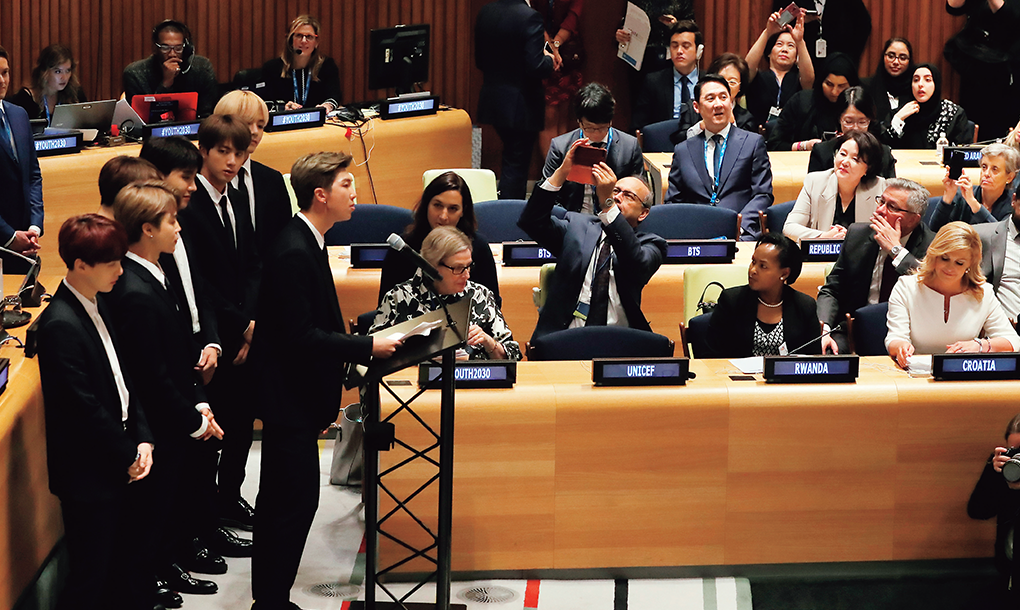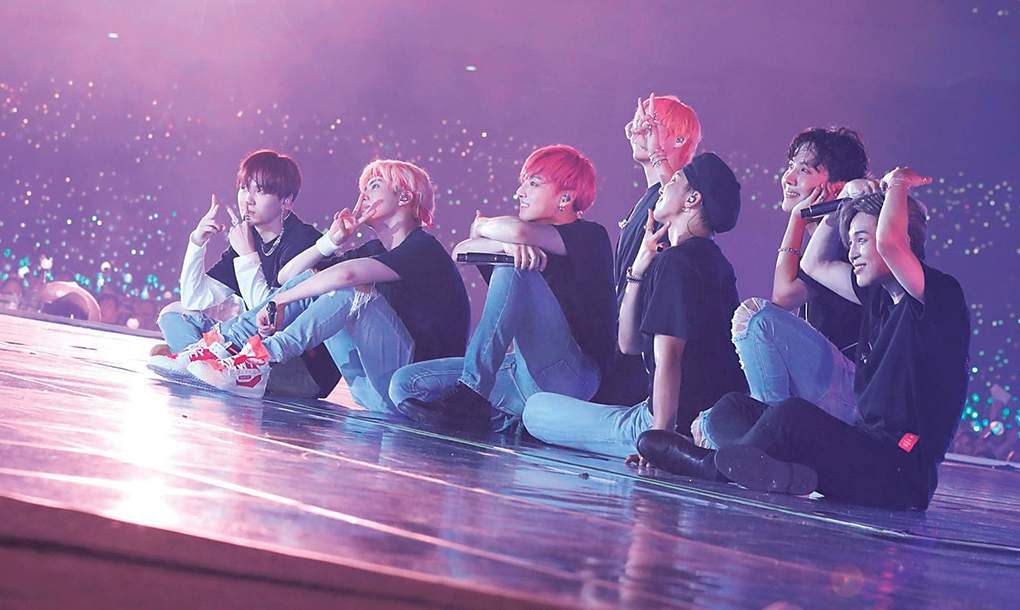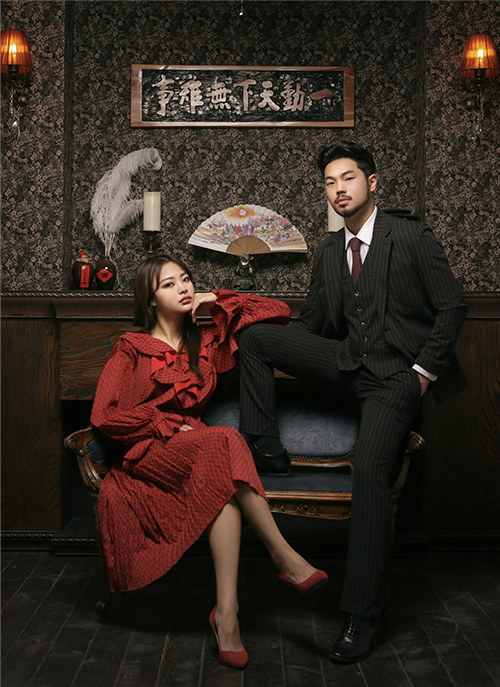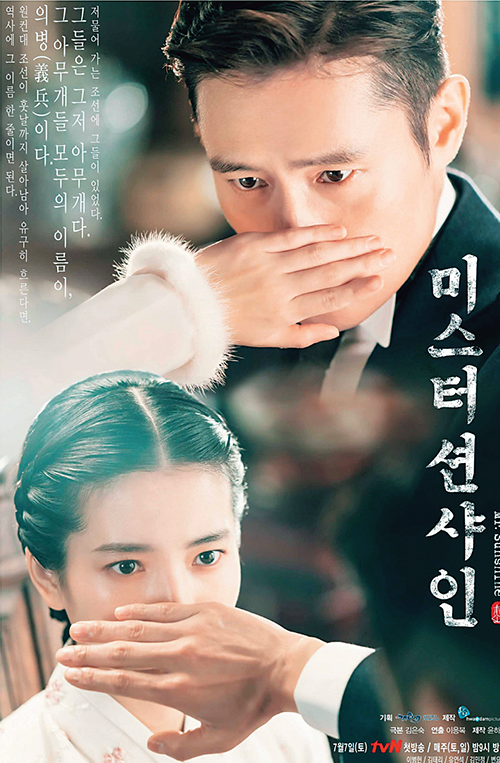Korea was forced to open its ports under the Korea-Japan Treaty of 1876 (a.k.a. Treaty of Ganghwa), which resulted in rapid cultural changes. A century later, the wave of cultural globalization is ushering in the “second enlightenment” era. Today, unlike their forebears a century ago, Koreans are proactively utilizing digital media to globally promote their cultural potential.

RM on behalf of BTS delivers a speech at the 73rd U.N. General Assembly on September 24, 2018 to mark the launch of “Generation Unlimited,” a new global youth initiative by UNICEF. Their message “Find your voice” resonated deeply with youth around the world. © The Chosun Ilbo
The acme of Korean pop culture content in 2018 was arguably the hit TV series “Mr. Sunshine.” Set in Joseon at the turn of the 20th century when American, French and Japanese ships frequented its waters seeking to open up the isolationist kingdom, the drama deeply resonated with viewers for bringing to light the unsung heroes of the “righteous armies,” or uibyeong, who sacrificed their lives to defend their country against foreign aggression. Along with the struggles of the freedom fighters, the drama’s significance also lies in its depiction of the social cleavages emanating from the introduction of new cultural imports from the West and the ensuing shift in consciousness across all social strata.
Whereas previous movies and TV dramas set in the late Joseon period were largely centered on anti-Japan narratives, “Mr. Sunshine” represents a marked departure. It res the streets of Hanyang, Joseon’s capital and today’s Seoul, lined with Western-style hotels, French bakeries and Japanese pubs and dressmakers, portraying the daily lives of the common people.
At the center of the story is a strong, spirited female protagonist who chooses a path that goes against her noble heritage. She is betrothed to a man chosen for her by her family but falls in love with a man named Eugene Choi; he was born into a slave family and escaped to America at a young age, returning a couple of decades later as a U.S. Marine Corps officer to serve at the American legation. Learning secretly how to shoot a rifle from a lowly hunter, she becomes a sniper going after pro-Japanese collaborators. The heroine embodies the independent, proactive women of the enlightenment period who chose to take charge of their own lives.

A scene from “BTS World Tour: Love Yourself in Seoul,” released at 3,800 theaters in 95 countries on January 26, 2019. It is the second concert film by BTS, following “Burn the Stage: The Movie.” © Big Hit Entertainment

A photo studio in Sangyeok-dong, Daegu, is a hotspot among youth for its retro-style photos that re the look and mood of the late Joseon era at the turn of the 20th century. Thanks to its explosive popularity, the studio has opened branches in Seoul and Busan. © Studio Sankyeok
Content with Global Appeal
“Mr. Sunshine” also has symbolic significance in that it serves as a new paradigm of cultural content required in today’s world of cultural globalization, interconnected via digital networks. The shooting of the entire series, with a production budget of a whopping 43 billion won (approximately US$39 million), was completed prior to the airing of the first episode. Almost unthinkable under Korea’s current TV series production system, it was made possible by Netflix, which invested 70 percent of the total production costs. The global media services provider also aired the drama simultaneously around the world. Thus it completely transformed the production landscape and consumption of Korean TV series.
Korea’s content industry is at a turning point. Viewers are increasingly sharing and consuming content from around the world real-time through global platforms such as Netflix and YouTube. Today, the country’s domestic media and entertainment industry stands on the threshold of the new globalization era. It must determine whether to expand further into global markets or remain content with the domestic market.
When looking at “Mr. Sunshine” from this perspective, its historical background reveals greater importance. A significant period in the nation’s history, the turn of the 20th century in Korea also contains elements that global viewers can relate to. The romanticized desire for freedom, peace and love conceived during this time is a theme that transcends nationality and ethnicity. Thus the drama was able to garner a broader viewership.
Characterized by the clash of tradition and an influx of foreign culture, this unique period in Korean history makes an interesting backdrop that allows directors to unleash their imagination. For instance, take the film “The Good, the Bad, the Weird,” directed by Kim Jee-woon and set in the same era. A take on the Western film genre, the imaginative devices employed in the film, inspired by the period’s confluence of disparate cultures, hightened its entertainment value and cinematic quality.
New Standards
A prominent example and important icon of the “new enlightenment” period is the pop phenomenon BTS, also known as Bangtan Boys, who have soared to global stardom. By actively utilizing social media platforms such as YouTube, the boy band communicates with fans around the world, accumulating a powerful fan base called BTS ARMY that transcends nationality and language. The key driver of their global success is their music and dance, the universal language of humankind.
Interestingly, the BTS craze was met with an anachronistic form of antagonism in Japan. Jimin, one of the members, became the target of criticism by Japanese right-wing groups who took issue with a T-shirt he wore with an image of the U.S. atomic bombing of Japan alongside a design of letters commemorating Korea’s independence. A photo image of Jimin wearing the T-shirt circulated on social media, touching off instant controversy and eventually leading to an apology by the band’s management agency. Apart from the young star’s lack of consideration in his choice of attire, the incident attested to the changing paradigm of cultural consumption in the age of global interconnection: The Japanese right-wingers’ demand that all Korean idol groups be banned from popular TV shows in Japan proved outdated at a time when fans around the world react real-time via digital media.
The incident also shows that the age of new enlightenment calls for a new global standard in cultural content that goes beyond outdated concepts, such as national and regional boundaries. This age of global cultural interchange requires values that people across the world share and relate to - values such as freedom, peace and coexistence that trump confrontation and competition.
If they look back 100 years to late Joseon and reflect on the experiences of their forebears,
the choices for content creators of our days become evident.

The poster of “Mr. Sunshine,” one of the biggest hit TV shows of 2018. The drama illuminated the struggles of the nameless fighters of the “righteous armies” during the Korean Empire and depicted proactive, independent female characters. Also portrayed in the drama are the first modern commercial establishments in Seoul, such as Western-style hotels, bakeries and dressmakers. © Studio Dragon
New Challenges
“Bohemian Rhapsody,” the Oscar-winnig biopic about the British rock band Queen and its lead singer, Freddie Mercury, provides another outstanding instance of the shifting cultural landscape and patterns of cultural consumption in this new media age. The film was a huge sensation in Korea, breaking box office records for music films and making an even bigger splash than in the band’s homeland, England. Box office sales were driven by sing-along screenings, a collective movie-watching experience where audiences danced and sang along to Queen’s hit songs featured in the movie.
The nature of content is changing so that, although creators produce the content, it is the consumers who complete it. Just as BTS performances would not be complete without the ARMY singing and dancing along with them, the passionate audience response to “Bohemian Rhapsody” is what perfected the movie-watching experience. The engagement of consumers gives new meaning to cultural consumption regardless of language or country.
With the rise of new media platforms, an increasing number of TV celebrities are enjoying side careers as one-person media creators. Meanwhile, top YouTube creators, such as Buzzbean, Banzz and Ssin, command even greater popularity and influence than famous TV personalities. Content creators who rose to YouTube stardom have ventured into television, appearing in variety shows and commercials, whereas TV celebrities are increasingly trying their hand at personal broadcasting, indicating a power shift from old to new media.
Digital networks d by new media technologies have ushered in the era of new enlightenment characterized by cultural globalization. If they look back 100 years to late Joseon and reflect on the experiences of their forebears, the choices for content creators of our days become evident. The doors are wide open and the path is clearly laid out. They will have to explore ways to safeguard their own culture while pursuing universal values shared by humanity.